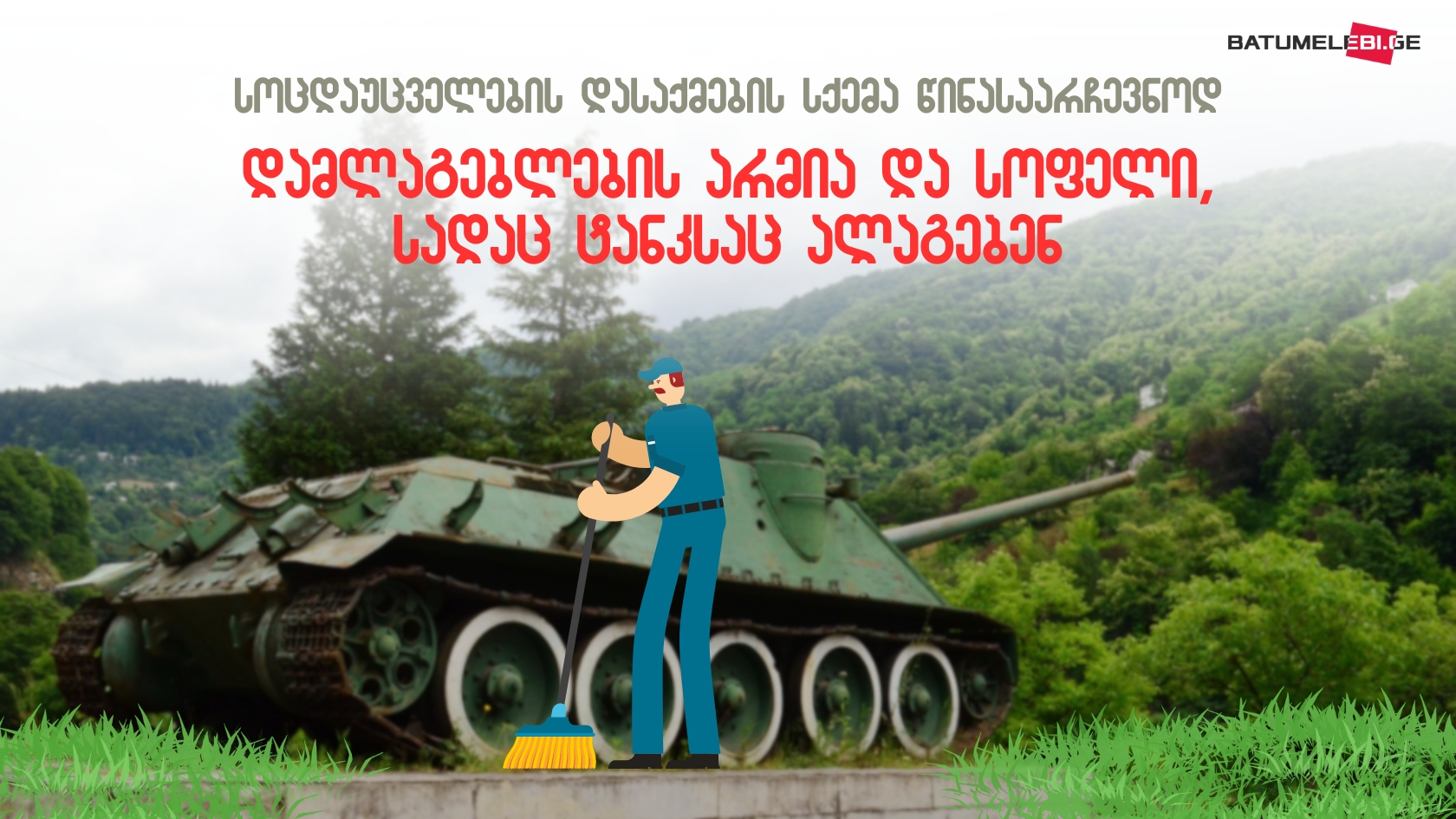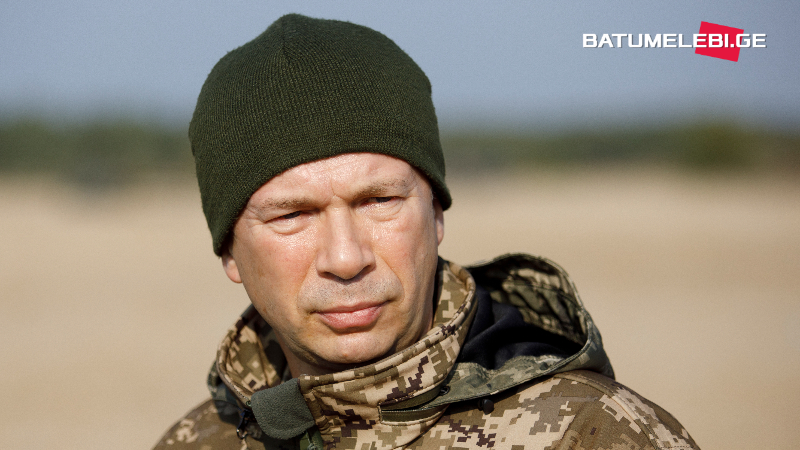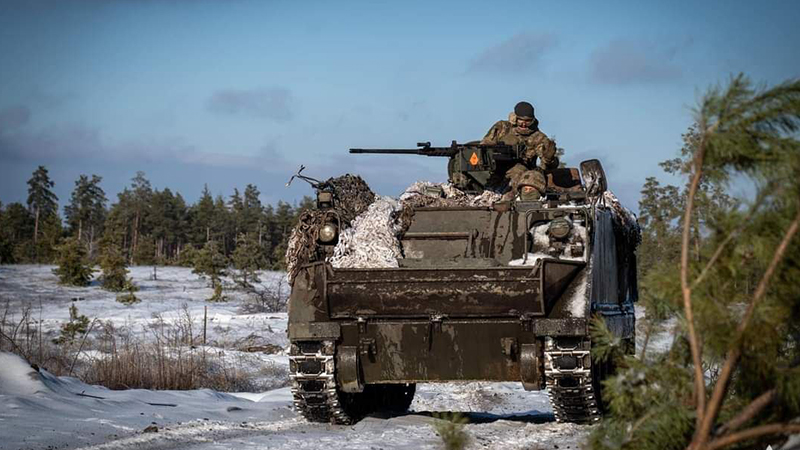“They employed their voters and made 150 men cleaners in just four villages alone. It’s like a rally if you think about it,” says Shalva Kobuladze, with a hint of irony. We to him him in the small village of Zvare in Keda, where he shared insights into the employment of socially vulnerable individuals, a practice observed in this village and others.
Shalva Kobuladze raises concerns that the “Georgian Dream” might be strategically hiring socially vulnerable individuals in villages for electoral gains. According to him, ‘they formalize the employment on the state budget, but in practice, they intend to utilize these individuals as electoral coordinators for the party’.
In March 2022, the government launched a State Public Works Program, offering socially vulnerable people employment in public works while maintaining their allowance. The salary for any such job is 300 GEL.
However, the State Employment Agency didn’t provide Batumelebi with the requested public Information regarding the details of the program
According to the State Employment Agency’s 2022 parliamentary report, “71,319 citizens applied, and 29,323 socially vulnerable people were employed in public works.”
In the village with only 57 households, 12 socially vulnerable people are employed. We met some of them working on the village road, cleaning the drainage channel.
Although they found it difficult to specify their daily duties, everywhere they say ‘We clean the village’.
For instance, citizen Khasan Beridze from the Keda centre questioned the employment program for socially vulnerable people: ‘They hired individuals to clean the cemeteries, guard stadiums, and guard the gardens. Why does the old tank in Tsoniarisi need guarding?”
“Batumelebi,” in Batumi and randomly selected villages such as Zvare and Zesopeli in Keda, as well as Shuakhevi’s village Baratauli, endeavoured to investigate the state public works program for socially vulnerable individuals.
An employed under the program in Zvare expressed, ‘I am with the Georgian Dream, others I don’t know.’
A socially vulnerable woman Nana Gatenadze, who lives in Zvare and works as a cleaner under the program, told us directly that she supports the “Georgian Dream” and works as a coordinator for the party during elections.
“…I’m a teacher, but currently unemployed. I secured this job, and I’m working. I am satisfied with our governor.
Now, I’m enlisted in school, taking exams, as a primary school teacher. I used to work, and I still try to tutor children,” Nana Gatenadze shared with us.
“I am with the Georgian Dream; others, I don’t know,” answered the employee, further noting that “supporters of the United National Movement party are also employed” when we inquired whether it is mandatory to support the “Georgian Dream” to secure this job.
“Was your employment linked to your support for the ‘Georgian Dream’?” we asked the citizen.
“I am part of the Georgian Dream; I work as a coordinator,” replied Nana Gatenadze.
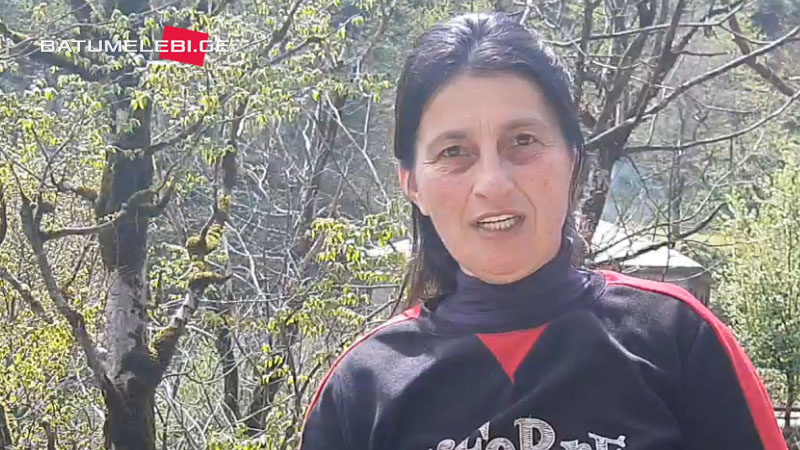
Nana Gatenadze
We separately interviewed socially vulnerable employees working on the road in Zvare. They uniformly described being assisted by the “village governor” in securing employment and signing a contract with the social service agency. “Although we haven’t saved the contract, we know that the village governor is supposed to assign tasks to us,” they provided identical responses.
Unlike Nana Gatenadze, others we spoke to deny any connection with political parties, although they also note that “not everyone can get employed,” and they do not know why.
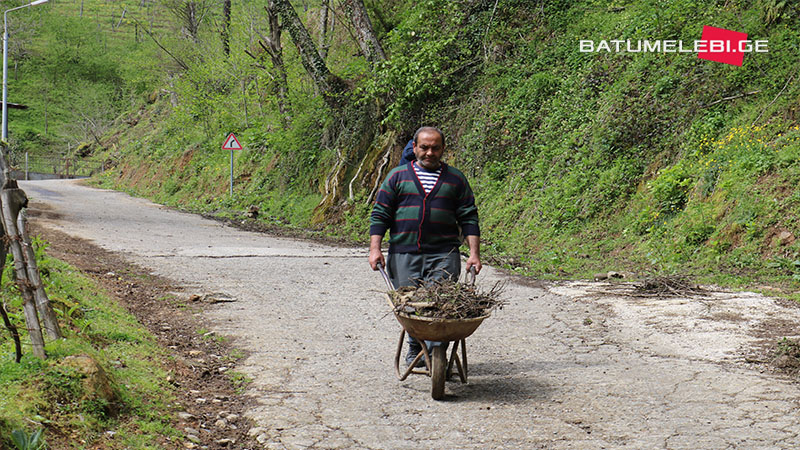
A Socially vulnerable person employed in the village of Zvare, Keda

Socially vulnerable persons employed in the village of Zvare, Keda
“Everyone wants to work; no one is unwilling. Many people approached me expressing their desire to participate in this program,” shared Badri Gogitidze. He is also socially vulnerable and secured a job as a cleaner in the village of Zvare.
“Why can’t others work with your information?” we inquired.
“I don’t know; I’m not informed at that level,” replied Badri Gogitidze with a smile. He then proceeded to explain how he got employed: “I didn’t fill out anything; I was hired as an assistant to the head of the village.
Everyone has their own area, but today we organized a Shabatoba [collective volunteer cleaning]. Everyone has their designated sections and oversees them, ensuring cleanliness, whether it’s a fallen leaf or anything else. Additionally, if assistance is required in other villages, we will go in phases. For example, if there are landslide issues and they can’t cope alone, we participate there too,” shared Badri Gogitidze with us.
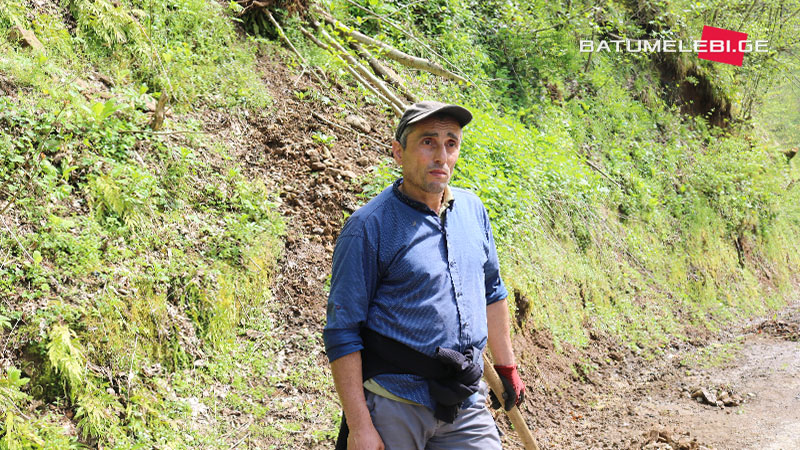
Badri Gogitidze
According to the employees, they work from 10 a.m. to 5 p.m., although they cannot specify the nature of their work. They were unable to present us with contracts, and the state keeps the data secret regarding the terms and conditions under which it employed 30 thousand socially vulnerable people.
“For instance, up there where you saw the church, I was assigned to that place. I have to clean everything; if there is anything, I don’t leave anything,” shared Irina Beridze. She lives and works in the village of Zesopeli in Keda and mentioned that she works from 10 a.m. to 5 p.m.
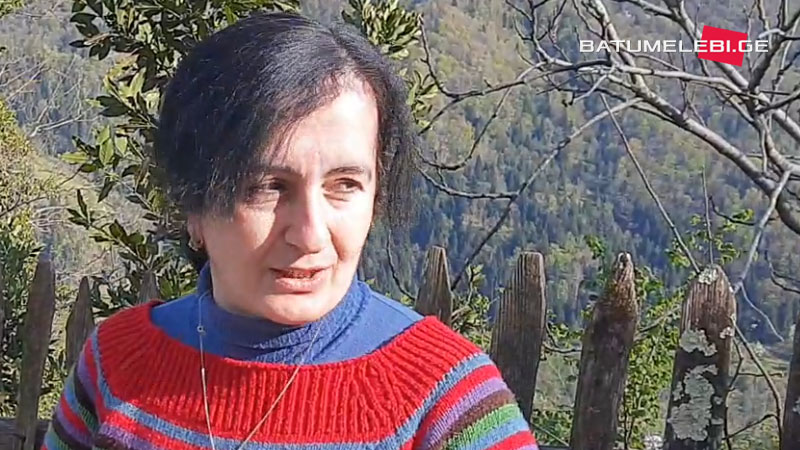
Irina Beridze
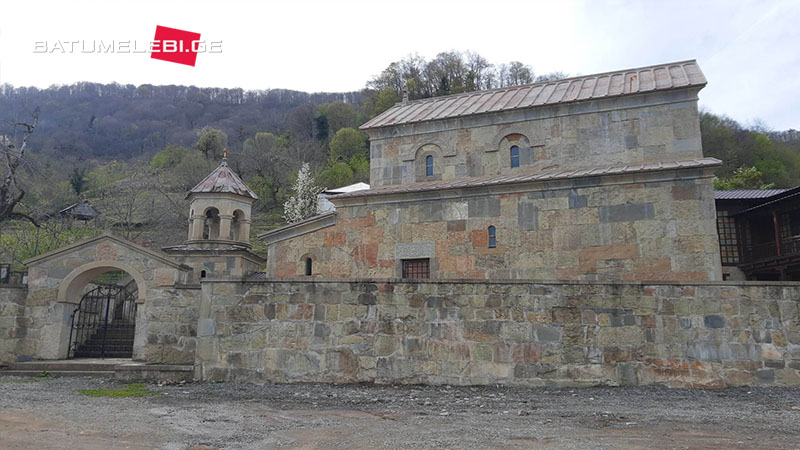
Village Church of Zesopesli
“Does it take so much time to clean the church every day?” we asked her. It is difficult for Irina Beridze to justify needing 8 hours every day to clean the village church.
“No, it doesn’t take that long. I can tidy up in an hour, half an hour… I go up there often and take a look at everything,” Irina Beridze seems embarrassed.
“Sometimes I have to work up or down, we don’t have a problem, we do the work according to how we are ordered,” she told “Batumelebi.”
“Everyone has their area, and they clean it; I have nothing to do with it,” stated Tengiz Gatenadze, the representative of the mayor of Keda in Zvare. He confirmed that only in the village of Zvare, where 57 families live, 12 men work for cleaning, and in Zesopeli, 13 socially vulnerable people were employed as cleaners.
“Some live seasonally, not always here; they come and go… 40 families are in Zvare permanently.
Socially vulnerable people have their own specialists and are monitored; they are checked by the Social Security Agency. None of them is a child; everyone has their own area of action, and they clean up by themselves,” Tengiz Gatenadze explained.
“What does the tank have to do? They are cleaning the [administrative] centre, and the tank is also in the centre [of the village],” – what is revealed about the “guarding” of the Tsoniarisi tank.
“What does the tank have to do? They are cleaning the village centre, and the tank is standing in the centre of the village. They are not the guards of the tank. Nobody will move that old tank,” – Resan Beridze, the mayor’s representative in Keda, met with us, expressing his offence. It appears he had seen the video commentary of Khasan Beridze, a resident of Keda, published on April 10, 2023, in “Batumelibi,” where the latter questioned the need for guarding the tank.
In the village of Tsoniarisi, “Batumelebi” confirmed with locals that two socially vulnerable individuals are employed in the “guarding” of the tank. When “Batumelebi” contacted these individuals, one mentioned that he is no longer working on tank protection and cannot answer any other questions. The other stated that he does not want to talk to journalists at all.
“One of them has already been dismissed; he is working elsewhere,” Resan Beridze, the representative of the Keda Mayor in Tsoniarisi, informed “Batumelebi”. According to him, at this stage, only one person is working in the centre of Tsoniarisi village, including cleaning the tank.
How many socially vulnerable people were employed in Tsoniarisi? – Resan Beridze told us that he would clarify the data and contact us himself.
A Soviet-era tank has been standing in the administrative centre of Tsoniarisi for decades. This place is adjacent to the Batumi-Akhaltsikhe highway. In the village of Tsoniarisi, we were told that the tank and the centre had neither a cleaner nor a guard until now and this program.
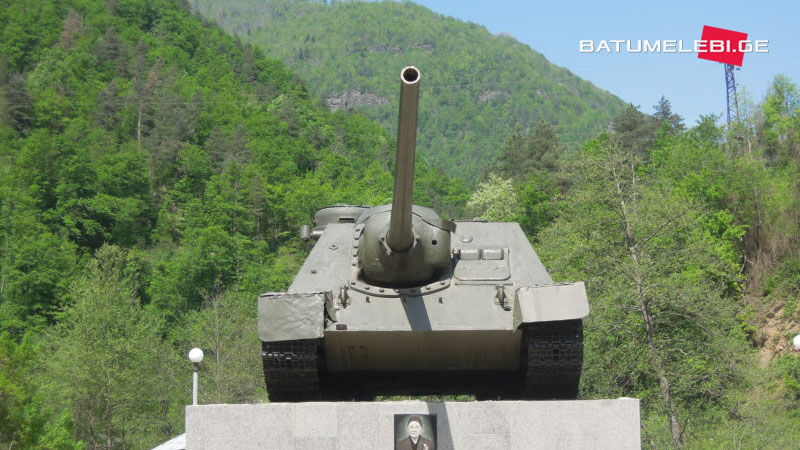
A Soviet-era tank has been standing in the administrative centre of Tsoniarisi – photo from the archives of “Batumelebi”
Baratauli village – 32 socially vulnerable people are employed, 5 people clean the building of the village administrative centre only
In Shuakhevi, within the 5 villages of the Baratauli community, 32 socially vulnerable people are employed. The employees are responsible for cleaning up the village, while specifically, 5 individuals focus on cleaning only the building of the administrative centre of the community, referred to as the “Kantora,” where the representative of the City Hall works alongside 2 assistants.
Additionally, there is a local doctor and another person who contributes to the club and the library.
“My responsibility is to tidy up the chapel and its surrounding areas. I start working at 6 o’clock in the morning to organize the chapel, and then I return home,” describes Temur Katamadze, a socially vulnerable person living in the village of Baratauli in Shuakhevi.
“The chapel has to be cleaned every day. I go early in the morning; if there is any dust, I clean it, vacuum it, and that’s it. Cleaning the area around the administrative building is also part of my job, including the bus stop.
If necessary, they can call us to help on the roads. We have a total of 4 people working in the centre. A representative of the City Hall works in the centre, and one of them cleans his office,” says Temur Katamadze.
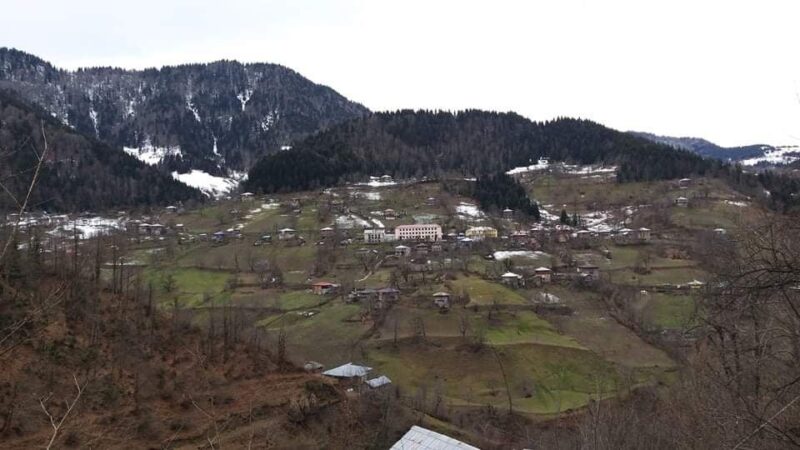
Shuakhevi, Baratauli village, photo from “Baratauli” Facebook page
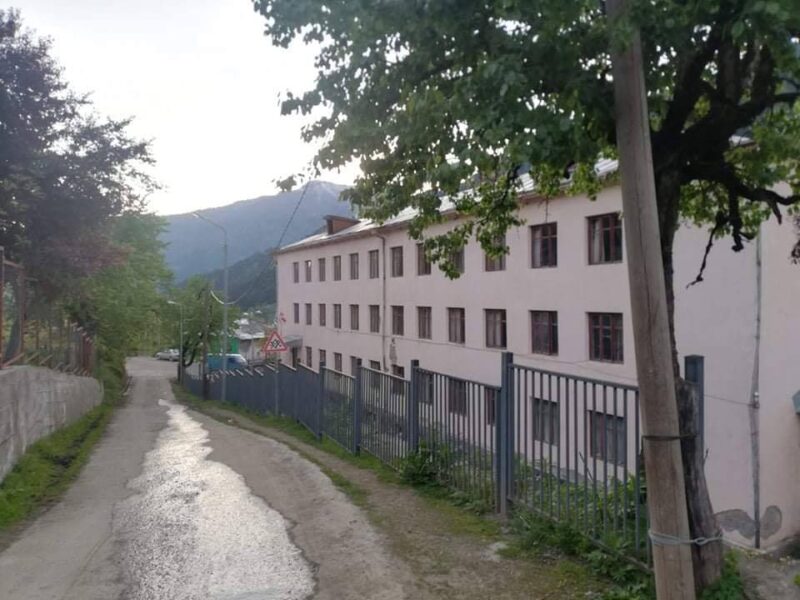
Shuakhevi, Baratauli village, photo from “Baratauli” Facebook page
He finds it difficult to describe how the 4 cleaners divide the work in the centre of a small village:
“I’ll tell you: one cleaner cleans the doctor’s room… there is also the council hall and the stairs – one person cleans the hall, one cleans the chapel, and one cleans the office of the Mayor’s representative,” Temur Katamadze tells us.
“Every day?” – We ask the employee.
“When the roads were frozen in winter, we worked on it – we put sand on the road so that the transport would not be interrupted.
There are still others who work to clean the water basins, cleaning the drainage channels. I don’t know how many are employed,” says Temur Katamadze.
“A total of 5 socially vulnerable people work in the centre of the village, and one person cleans the stadium; we employed them there,” clarifies Jumber Katamadze, the representative of the Shuakhevi City Hall in the Baratauli community.
It was clarified that 5 cleaners work every day in the Baratauli administrative centre at the moment.
Unlike other Mayor’s representatives, Jumber Katamadze talked to us about employees. He also mentioned that he himself defines the work for the employees, what they have to do, and the monitoring is in his hands.
“We also handle record-keeping; every day is calculated, and it is 10 GEL per day. If they did not work, 300 GEL is deducted.
They came from Batumi for inspection, and 7 out of 32 employees were interviewed. The City Hall signs their contracts after the agency includes them in the list of beneficiaries,” Jumber Katamadze tells us.
“Is it logical that a building in the centre of the village is cleaned by 5 people every day?” – We asked the representative of the City Hall in Baratauli.
“I think it is logical. There is a library, a medical centre, and storage rooms, which are used by the villagers,” says Jumber Katamadze.
We asked him how many cleaners there were in the village until the spring of 2022, before this program started.
“Before that, we didn’t have cleaners at all; there was no such staff. Before that, we cleaned with our own efforts,” said Jumber Katamadze to “Batumelebi.”
The representative of the City Hall categorically excludes the partisan selection of people who work as cleaners and receive 300 GEL per month
“How to choose according to the party? It’s impossible. Representatives of all kinds of parties are employed. I know several hardcore United National Movement activists who are employed,” claims Jumber Katamadze, although he refused to help us contact any such employee who is an open supporter of the opposition.
“Batumelebi” talked to another employee in Baratauli. Davit Kiladze says that partisan politics has nothing to do with it, and he is grateful to the village governor who helped him find employment.
He describes that he was informed by the Social Service Agency that tasks would be assigned by the village trustee. Initially, various public services announced vacancies for socially vulnerable individuals within the framework of this program. However, it turns out that the “scope of work” for the program employed people is mainly defined by the representative of the town hall in the village aka the village trustee.
According to employees hired under the program, the scope of work is determined based on the community’s needs.
“I was interviewed at the Social Service Agency, and they told me to do whatever the community representative instructs me to do.”
“It depends on what the trustee instructs me to do, whether it will be the main building, water for the kindergarten, or whatever. As soon as the trustee of the community calls me, I’m ready.”
“In the contract, it is written for the maintenance of the water main structure, but then they told me that chlorination is necessary; and that I was not a specialist. I do what the trustee of the community instructs me,” Davit Kiladze told us.
“Batumelebi” also became interested in the employment of socially vulnerable people in the villages of other municipalities: for example, in Keda, in the village of Kokotauri, 23 people clean and maintain the village road, and in the village of Didachara in Khulo, there are 20 employees, including 5 socially vulnerable individuals, in the kindergarten, where there are 33 children.
“I was the coordinator of ‘Georgian Dream’; I go to every election – wherever my brother is, so am I,” Teona Shavadze told us. She is socially vulnerable, and within the framework of the program, she was employed as a cook’s assistant in Didachari Kindergarten.
“I photograph the damaged squares,” what else do employed individuals under the program in Batumi say?
In April 2022, Rusudan Tarieladze, employed in Batumi, told “Batumelebi” how she was hired in the Tamari Administrative Unit of the Batumi Municipal Services Agency under the program. “I photograph the damaged squares,” she told us about her duties.
“Batumelebi” spoke to several socially vulnerable people at the state public canteens located on Tabidze Street and Lermontovi Street in Batumi. It turned out that some of them cannot find employment within the program, or, unlike in the villages, they are offered a job where they need to work all day, for example, a nanny in a kindergarten.
“It would be better than unemployment, but I haven’t received an answer yet,” Maia Sharadze told “Batumelebi.”
“I was refused; they told me that I was a new beneficiary and I cannot get employed in this program yet. I am on a family package allowance,” Inga Surmanidze told us. She wanted to work as a nanny at the kindergarten where her children attend.
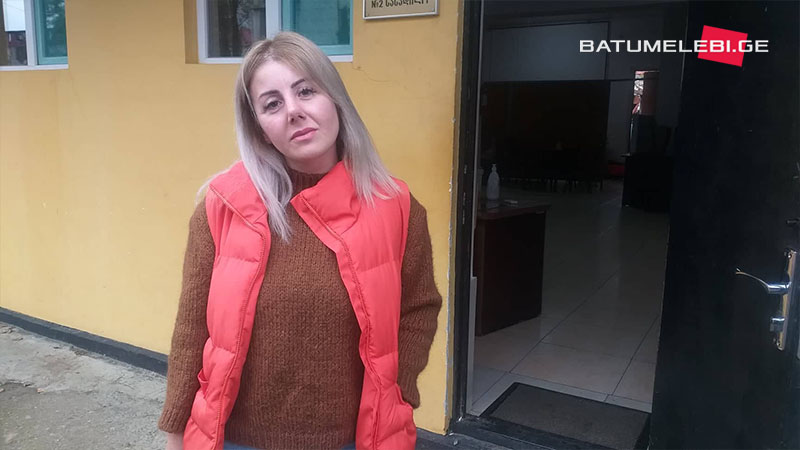
Inga Surmanidze
“I know others were employed with such benefits; they go to kindergarten with their children in the morning and return in the evening.
My family has been receiving an allowance since May, and the state canteen provides us with free meals. They didn’t offer me any job… My husband is only self-employed – he takes any short-term or long-term job he finds available,” Inga Surmanidze told us in December 2022.
Several socially vulnerable people told “Batumelebi” then that they got a job and are satisfied with this program, or they don’t want to get a job for 300 GEL at all because they can’t leave their young children with anyone
“I work on cleaning cemeteries; I am a lonely person, I have to go out for 4 hours every day,” Malkhaz Kartsivadze told us.
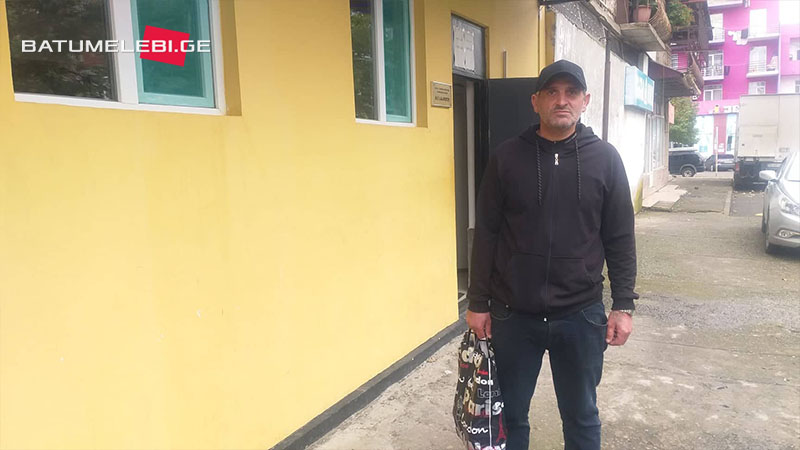
Malkhaz Kartsivadze
Malvina Bolkvadze: “I was offered employment, but I said, who will look after my children? Even if it’s only for a few hours, but who should I leave the children with all day?”
Nino Surmanidze: “I got a job at the 33rd kindergarten in Batumi; I work as an assistant in the kitchen. I help with sorting: I weigh pasta, sort potatoes, put sour cream in the refrigerator… Before that, I was sitting at home all the time, and this 300 GEL means a million. I go to work at half past ten, and I’m free at half past four.”
These cases are not exceptions, where socially vulnerable individuals are employed for fictitious positions, leading to the question: why did the state decide to employ thousands (currently 30 thousand) of socially vulnerable people, especially when the employees are associated with the “Georgian Dream,” and there is no apparent need for employment in specific budgetary organizations? What is the possibility that during elections, socially vulnerable individuals, now practically fictitiously employed at the expense of the state, will not feel obligated to obey the orders of the “Georgian Dream” or to its coordinators who are among them in the employment program?
It should be taken into account that the program for the employment of socially vulnerable individuals will end in the spring of 2025 – after the conclusion of the parliamentary elections in 2024. Before the elections, the “Georgian Dream” is using the cover of the position that it “does its work” and is massively providing jobs to socially vulnerable people.
“Appropriate recommendations were issued for the detected discrepancies” – Employment Agency about the employment program for the socially vulnerable
The Employment Agency, in collaboration with the Social Protection Agency, implements the employment program for socially vulnerable people.
Towards the end of 2022, “Batumelebi” sought public information from the employment agency, but unfortunately, no information was provided in response to the request.
“In the process of implementing the program, the main partnership and support for the agency were provided by local trustees and local self-governments,” as noted in the 2022 parliamentary report of the Employment Agency titled “Planning and Implementation of Employment Policy.”
“The program was initiated on March 1, 2022. To execute it, a team of specialists was assembled to plan, implement, and coordinate the necessary processes for program administration.
Approximately 30,000 vacancies from 1,069 suppliers were registered in the employment information system. Across Georgia, 71,319 citizens applied to the employment agency for the public works program. Out of these, 29,323 socially vulnerable individuals were employed in public works, with 15,602 being women.
In 2022, the State Employment Agency conducted extensive monitoring in collaboration with local self-governments and the Labor Inspection Service. This monitoring comprehensively covered the employers registered in the special registration system and the individuals employed by them. Appropriate recommendations were issued for the detected discrepancies”, reads the report. However, it does not specify the nature of these ‘discrepancies’ within the program.
Even as of May 11, 2023, the press centre of the State Employment Agency failed to provide us with public information, and updated data on the employment of socially vulnerable people, as required by law. They did not offer any explanation for not providing public information for more than half a year.
In accordance with relevant legal acts, “public work” is defined as employment in a vacant position that can be performed by an individual with any qualification. The suppliers of work are state agencies and local self-governments.
To be enrolled in the employment program, beneficiaries can submit applications to the service centres of the Social Service Agency or to the State Employment Agency. The program caters to able-bodied individuals aged 18 and older, with a family rating score not exceeding 120,000, and receiving the targeted social allowance.
For a duration of 4 years, individuals participating in the employment program are assured the status of being socially vulnerable, along with the associated monetary and non-monetary benefits. Their socioeconomic status will not undergo reevaluation during this stipulated period.
Under the same program, if a socially vulnerable person opts not to participate in employment, their socioeconomic status is determined based on the outcomes of the annual evaluation.
